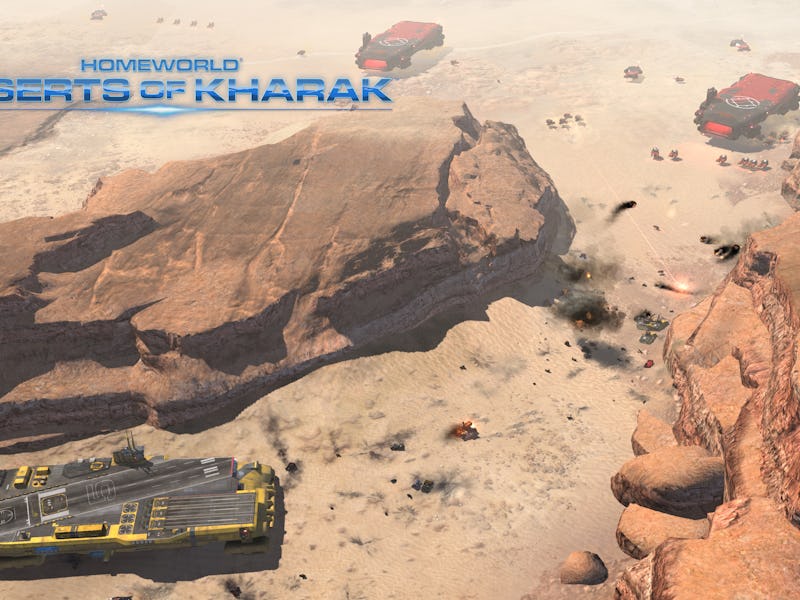The Classic Video Game Series 'Homeworld' Just Got Revived. Is it Worth It?
A new 'Homeworld' tries to give the real-time strategy genre a much-needed kick in the ass. It mostly succeeds.

Why is a new Homeworld game exciting? The original two Homeworlds represent a sort of tragic dead end in the genre of real-time strategy, an incredibly cool idea for a game that was possibly too complex to manage. But they were impressive and well-loved, and the news that the series would be coming back with the just-released Homeworld: Deserts of Kharak was a very pleasant surprise.
Homeworld was based on a can’t-miss premise: you played a newly spacefaring planet, who found an ancient spaceship plan and a map to your people’s origins. But as the ship was launching, an implacable power appeared, blew everything they could up, and chased the survivors through the galaxy, disrupting your quest to find the titular homeworld. This dangerous sci-fi road trip was reminiscent of Battlestar Galactica or Star Trek: Voyager, and would be used to recent acclaim in the much-loved indie game FTL.
But Homeworld didn’t just have a cool story, it also had cool game idea behind it. As commander of the fleet, you engaged in real-time battles. In 1999, the technology of gaming had just gotten to the point where it would be plausible to do large-scale space battles on-screen in three dimensions, with fighters buzzing through asteroid fields, destroyers skirmishing with one another, and cruisers exploding spectacularly. All this under player control, using space tactics to gain advantages. Here’s some footage from the recent remastered re-release (the graphics are improved, but the core is the same).
And it had style! Before the Battlestar Galactica reboot, Homeworld had a desparate group of humans, protected by a single character, fleeing across the universe with strong religious overtones and wonderful Middle Eastern-influenced music.
It wasn’t a perfect game — it was far too easy to ruin your campaign by not exploiting early missions enough, and not know it for another several hours — but it was damn memorable. As the real-time strategy genre crawled into nichedom by just trying to copy Starcraft and Red Alert over and over, with two-dimensional base-building on planets, Homeworld’s three-dimensional space combat ambition stood out.
Which made it an odd choice that the series would be resurrected by the planet-bound prequel Deserts of Kharak, where you control the expedition that discovers the ship plans that would set the original Homeworld into motion. If the original games were defined by how unconventional they are, this premise seemed to be making it a basecraft-style game. Happily, publisher Gearbox and developer Blackbird Interactive (comprised of former Homeworld team members) have managed to build a game that transfers much of the feeling of the originals to the ground-focused prequel.
The first thing is the story, and how it manifests in-game. In Kharak, as in its predecessors, you’re managing a small fleet on the run. The planet Kharak is a sea of sand, so you build more of a navy, with a carrier at the center. And your units carry over from mission to mission, meaning there’s both an overall coherence to the campaign as well as reason to not just win in each scenario, but win and keep your units alive.
Given how far the real-time strategy genre has moved away from notable campaigns, this is very pleasant. That said, the scenarios tend to be way too chatty, and each section of the mission too disjointed, to be truly effective at the level of the original or great RTS campaigns like Warcraft 3. Still good, but definitely missing a spark.
The actual combat, though, is a real joy. The incoherent muddle of most RTS games is replaced by crisp formations and clear unit capabilities. The joy of seeing space fighters swooping around in the original Homeworld is recreated by Kharak’s Light Attack Vehicles performing a similar function. And the three-dimensionality of space may be gone, but Kharak offers clear elevation indicators and bonuses, giving the physical movement and tactics of its map space a surprisingly strong (and satisfying to succeed with) strategic heft.
As cool as Deserts of Kharak can be, though, there’s not much in it that suggests it might be a breakout hit. It’s a great addition to the RTS genre, and a welcome resurrection of a classic series. It’s gotten great reviews, though, so we’ll see if it turns into more than that — because a new, space-based Homeworld would be potentially fantastic.